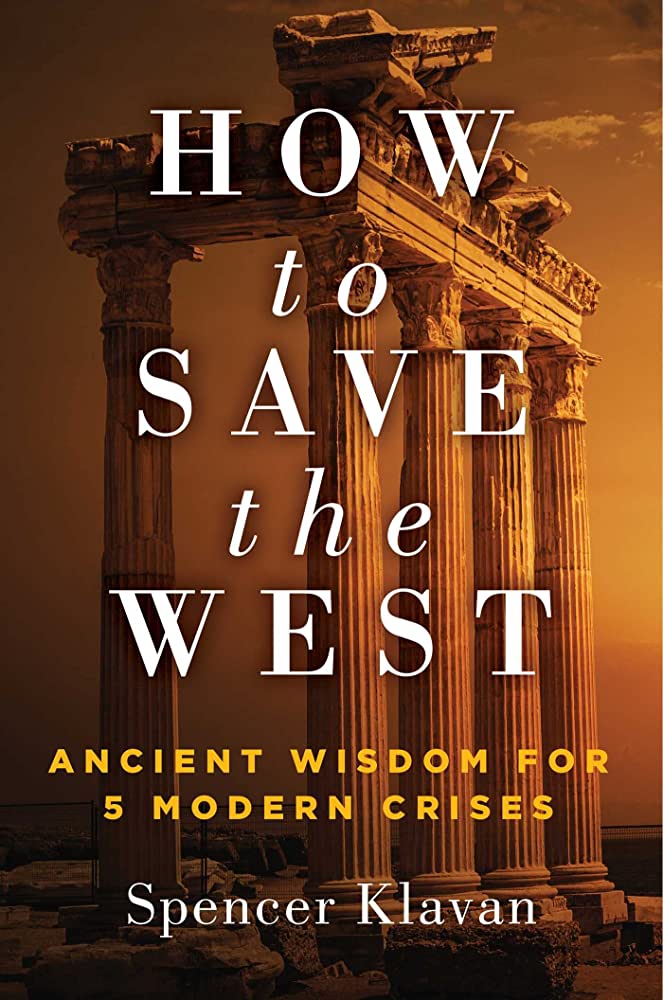
How to Save the West by Spencer Klavan
While  How to Save the West might sound like the title of a Jordan Peterson-style list of ways to improve life amidst the chaos of the modern world, Spencer Klavan takes a refreshing tack in his first book. Instead, Klavan’s book serves as an introduction to the greatest minds in history, with a dose of theological exegesis that makes the book into something of an unexpected apologetic as well.
How to Save the West might sound like the title of a Jordan Peterson-style list of ways to improve life amidst the chaos of the modern world, Spencer Klavan takes a refreshing tack in his first book. Instead, Klavan’s book serves as an introduction to the greatest minds in history, with a dose of theological exegesis that makes the book into something of an unexpected apologetic as well.
Klavan’s excellent work on his podcast Young Heretics serves as a sort of “college education you never got,” walking through the great works of classical antiquity that have fallen out of favor with today’s intellectual elite thanks to what the author refers to as “chronological chauvinism.” If Young Heretics was a college curriculum, then How to Save the West is Klavan’s capstone course to a classical education based on the Great Books of the western world.
Klavan discusses five modern crises, problems that increasingly threaten to demolish the West as we know it. These issues, the crises of reality, the body, meaning, religion, and the regime, are each paired with a chapter detailing what the great minds of centuries past had to say about them. This format, and the wide range of issues these topics span, allow plenty of room for the author to dive into some of the most interesting works ever written. Klavan is able to distill these complicated ideas down to their salient points in a way that even readers without a background in these texts will be able to grasp — but not without being tempted to dive deeper.
This is one of a few rhetorical tools Klavan employs, piquing a curiosity about the works of Plato and Aristotle by demonstrating just how relevant they remain. I found myself wanting to revisit texts like Ethics and The Republic thanks to Klavan’s ability to put them in context with modern problems. Klavan guides the conversation around and between complicated subjects like the connection between the soul and the body, our perception of reality, and nihilism, and always manages to point the discussion squarely back at what gives us a sense of meaning in the first place — but more on that later.
With the “Crisis of Reality,” Klavan describes the technocratic nightmare envisioned by the Zuckerbergs of the world that sees its people docile, fat, and high, content to live in pods, feast on bugs, and plug into the “Metaverse.” Klavan puts forth a clear parallel to Plato’s famous cave allegory from book 7 of The Republic, where instead of being chained to a wall watching shadows dance from a distant fire, we enslave ourselves to our imagined Metaverses, watching whatever version of reality the so-called experts deem fit for our eyes to see.

These themes clearly tie into the “Crisis of the Body,” where denial of reality creeps from the outside in — if the world around me can be whatever I wish, then why can’t my own physical form? Klavan utilizes the Platonic Forms and Aristotelian Metaphysics to expound on his point: “Being a soul in a body means you are a certain kind of thing: you are matter so configured as to be self-aware … you have a formal and a material cause. It follows that you also have a final cause, a goal.” The telos, the ultimate object, of the human body is the pursuit of virtue, Klavan says. As rational animals, we alone can bring truth, beauty, and goodness into the world, and have an obligation to do so. With the help of the ancients, he serves up a sharp critique of transhumanism: “The most likely outcome of this project is misery, ugliness, and neurosis. The human soul’s goodness, honor, courage, and excellence must live in a human body — or not at all.”
Klavan’s explanation of the “Crisis of Meaning” deals with popular nihilist philosophers like Nietzsche and Dawkins, and posits a question: “if the world is one giant factor of replication, then what, ultimately, is being replicated?” Klavan discusses the power of mīmēsis, the inclination to imitate what we consume, and why the the political battles over pop culture are so important: “things which have emotional power over us leave us with a sense of how the world is and how it ought to be.” If it is true, as the nihilists suggest, that we are merely advanced organisms replicating ourselves based on what we consume, we might benefit from more care about the media we venerate. Further, if the nihilists are not correct, and there is a meaning inherent to art and human life, where does that come from? Klavan’s next few chapters on the “Crisis of Religion” give us an answer.
How to Save the West is a work not only of philosophy, but of theology. Klavan’s writing is an excellent defense of religious faith — an apologetic — and also an explanation for why faith is so inherent to the human experience. We already try to live our lives as though they have meaning — why would an endless chain of self-replicating particles eventually arrive at such a conclusion? While the materialists may act as though science has disproven the existence of God, Klavan demonstrates that this couldn’t be further from the truth:
It is one thing to disregard certain kinds of truth for the sake of studying the material world. Isaac Newton … made no conjecture about who or what was exerting [gravitational] force, because he considered it a question that his research did not answer. … But it is another thing entirely — and a remarkable act of question-begging — to pretend that by disregarding those questions you have definitively answered them in the negative.
Klavan walks in the footsteps of C.S. Lewis in his own Abolition of Man, demonstrating universalities that we all already inherently know, but may not have taken the time to fully examine.
His final chapters set the religious subjects aside in favor of a more straightforward political one: the crisis of the American regime. While an optimistic reader may hope to find a recipe for how to right the ship, Klavan refuses to mince words about the state of the Union. But his argument, his real advice on how to save the West, is much more personal and convicting as a result.
The hour is late, and the war’s begun. The most important battleground in the culture war is the one most often forgotten. Within every human soul, within every family, within every day, there is a battle being fought over what principles, what beliefs, and what rituals will be accepted, taught, and passed on.
This is the not-so-secret crux of How to Save the West. We are not engaged in a fight over the soul of our nation — the fight is for our own souls. But this is not a bleak diatribe about chaos and destruction, it’s a hopeful nudge in the right direction. “No one knows the role he will play in history’s retrospect. But you and I wake up every day in a world that is real, surrounded by people who are also real, and that is enough,” Klavan says near the end of his final chapter. This is a similar idea to what Klavan’s father Andrew refers to as the “great speculation”: that all men have an inner life as important to them as yours is to you, and that all are of equal import to God.
The cloud of anxiety and impending doom that hovers over social media comes from the frenzy of people searching for meaning, because they have lost the meaning that is right in front of them. You do not need to be a part of that madness: sanity lies on the side of your better instincts, the instincts that tell you that what you do in life matters, and that reality is in fact real.
Klavan’s argument is very simple: your life has meaning, and you should endeavor to act like it. How to Save the West is a powerful reminder that there is meaning in our endeavors as conservatives — but also that we mustn’t forget what it is we’re actually trying to conserve. Spencer Klavan has spent much of his career imploring us to heed the advice of our forebears — perhaps it’s time we listen.
 The posts are coming!
The posts are coming!


0 comments
Kick things off by filling out the form below.
Leave a Comment